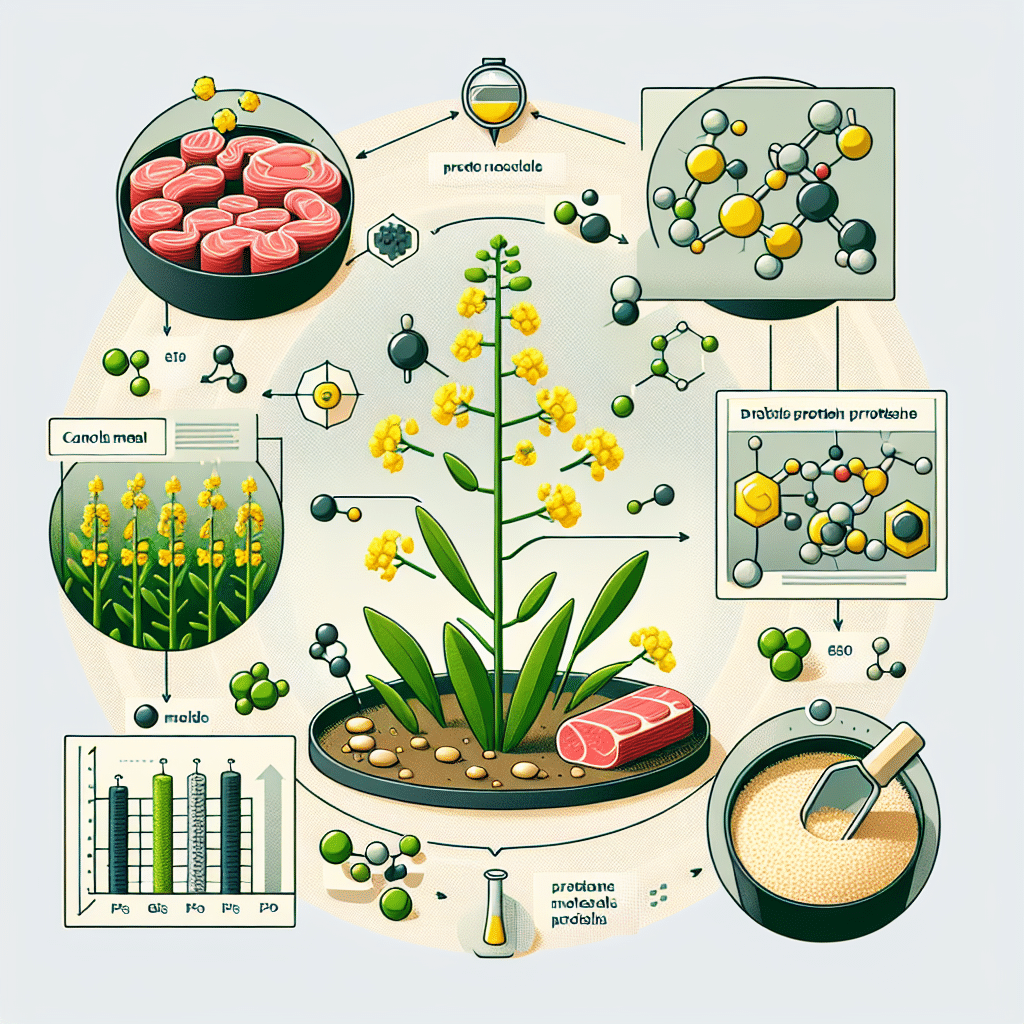Is Canola Meal A Protein?
-
Table of Contents
- Canola Meal as a Protein Source: Unveiling Its Nutritional Value
- Understanding Canola Meal
- Canola Meal’s Protein Content
- Comparative Analysis with Other Protein Sources
- Benefits of Canola Meal Protein
- Applications of Canola Meal Protein
- Case Studies and Research
- Challenges and Considerations
- Conclusion: The Future of Canola Meal Protein
- Explore ETprotein’s High-Quality Protein Products
Canola Meal as a Protein Source: Unveiling Its Nutritional Value

When it comes to protein sources, there’s a wide array of options available, ranging from animal-based proteins to plant-derived alternatives. Among the latter, canola meal has emerged as a significant player in the protein market. This article delves into the nutritional profile of canola meal, its applications, and its viability as a protein source.
Understanding Canola Meal
Canola meal is a byproduct of the oil extraction process from canola seeds (Brassica napus L.). After the oil is pressed out, the remaining solid material is processed into meal, which is primarily used as a feed ingredient for livestock. However, its potential extends beyond animal nutrition.
Canola Meal’s Protein Content
Protein is a crucial macronutrient necessary for building and repairing tissues, making enzymes and hormones, and supporting overall health. Canola meal is often overlooked as a protein source, but it contains a significant amount of this vital nutrient.
- Typically, canola meal contains about 36-38% protein on a dry matter basis.
- The protein quality of canola meal is relatively high, with a good balance of essential amino acids, although it is slightly lower in lysine compared to soybean meal.
- Its digestibility is also competitive, making it a viable protein source for various species, including humans.
Comparative Analysis with Other Protein Sources
When compared to other plant-based proteins, canola meal holds its ground. For instance, soybean meal is often considered the gold standard in plant protein for animal feed, but canola meal’s protein content is not far behind. Moreover, canola meal is a more sustainable option due to its lower environmental impact.
Benefits of Canola Meal Protein
Canola meal offers several benefits that make it an attractive protein source:
- Sustainability: Canola is a crop that requires less water and pesticides, contributing to a more sustainable agricultural practice.
- Non-Allergenic: Unlike some other protein sources, canola meal is not known to be a common allergen, making it suitable for individuals with specific dietary restrictions.
- Heart Health: Canola meal contains compounds that have been associated with heart health benefits, such as reducing cholesterol levels.
Applications of Canola Meal Protein
While traditionally used in animal feed, canola meal is gaining traction in human nutrition as well. It can be found in:
- Protein powders and supplements
- Plant-based meat alternatives
- Protein-enriched baked goods and snacks
Its versatility and nutritional profile make it an excellent ingredient for food manufacturers looking to enhance the protein content of their products.
Case Studies and Research
Several studies have highlighted the potential of canola meal as a protein source. For example, research has shown that canola meal can be effectively used in fish feed, replacing more traditional protein sources like fishmeal, without compromising growth or health.
In human nutrition, studies are exploring canola protein’s functionality in food products, such as its ability to form gels and emulsions, which are essential properties for food processing.
Challenges and Considerations
Despite its benefits, there are challenges to the widespread adoption of canola meal as a protein source:
- The presence of anti-nutritional factors, such as glucosinolates, which can affect the meal’s palatability and nutritional value.
- Flavor and aroma issues that may be off-putting in human food applications.
- Processing costs associated with removing oil and converting canola meal into a form suitable for human consumption.
However, ongoing research and technological advancements are addressing these challenges, improving the viability of canola meal as a protein source.
Conclusion: The Future of Canola Meal Protein
Canola meal is indeed a protein source with a promising future. Its high protein content, balanced amino acid profile, and sustainability make it an attractive option for both animal and human nutrition. As research continues to enhance its palatability and functionality, canola meal is poised to become a more prominent player in the global protein market.
The key takeaways from this exploration into canola meal as a protein source are:
- Canola meal is a significant source of plant-based protein with a competitive amino acid profile.
- It offers sustainability benefits and is suitable for individuals with dietary restrictions.
- While challenges exist, ongoing research is improving its potential in human nutrition.
As the demand for plant-based proteins continues to grow, canola meal is well-positioned to meet the needs of a more health-conscious and environmentally aware consumer base.
Explore ETprotein’s High-Quality Protein Products
If you’re interested in exploring high-quality protein options, ETprotein offers a range of organic bulk vegan proteins that cater to various industries. Their products, including organic rice protein, pea protein, and more, are characterized by a neutral taste, non-GMO, and allergen-free attributes. With L-(+)-Ergothioneine purity over 98%, ETprotein’s offerings are ideal for nutraceutical, pharmaceutical, and food and beverage applications. Contact ETprotein to sample their products and discover how they can meet your protein needs.
About ETprotein:
ETprotein, a reputable protein and L-(+)-Ergothioneine (EGT) Chinese factory manufacturer and supplier, is renowned for producing, stocking, exporting, and delivering the highest quality organic bulk vegan proteins and L-(+)-Ergothioneine. They include Organic rice protein, clear rice protein, pea protein, clear pea protein, watermelon seed protein, pumpkin seed protein, sunflower seed protein, mung bean protein, peanut protein, and L-(+)-Ergothioneine EGT Pharmaceutical grade, L-(+)-Ergothioneine EGT food grade, L-(+)-Ergothioneine EGT cosmetic grade, L-(+)-Ergothioneine EGT reference grade and L-(+)-Ergothioneine EGT standard. Their offerings, characterized by a neutral taste, non-GMO, allergen-free attributes, with L-(+)-Ergothioneine purity over 98%, 99%, cater to a diverse range of industries. They serve nutraceutical, pharmaceutical, cosmeceutical, veterinary, as well as food and beverage finished product distributors, traders, and manufacturers across Europe, USA, Canada, Australia, Thailand, Japan, Korea, Brazil, and Chile, among others.
ETprotein specialization includes exporting and delivering tailor-made protein powder and finished nutritional supplements. Their extensive product range covers sectors like Food and Beverage, Sports Nutrition, Weight Management, Dietary Supplements, Health and Wellness Products, and Infant Formula, ensuring comprehensive solutions to meet all your protein needs.
As a trusted company by leading global food and beverage brands and Fortune 500 companies, ETprotein reinforces China’s reputation in the global arena. For more information or to sample their products, please contact them and email sales(at)ETprotein.com today.












